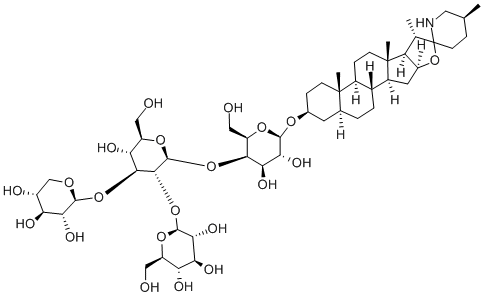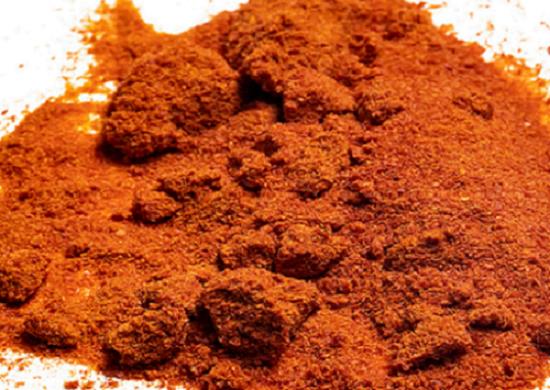Tomatine – a glycoalkaloid in tomato plants
Tomatine (sometimes called tomatin or lycopersicin) is a glycoalkaloid, found in the stems and leaves of tomato plants, and in the fruits at much lower concentrations. It has fungicidal, antimicrobial, and insecticidal properties. Chemically pure tomatine is a white crystalline solid at standard temperature and pressure. Tomatine, as well as the closely related aglycon (or aglycone) derivative tomatidine have been shown to have multiple health benefits [1].
Tomatine is a steroid alkaloid that is tomatidine in which the hydroxy group at position 3 is linked to lycotetraose, a tetrasaccharide composed of two units of D-glucose, one unit of D-xylose, and one unit of D-galactose. It has a role as an immunological adjuvant, a phytotoxin and an antifungal agent. It is a steroid alkaloid, a tetrasaccharide derivative, an alkaloid antibiotic and a glycoside. It derives from a tomatidine.
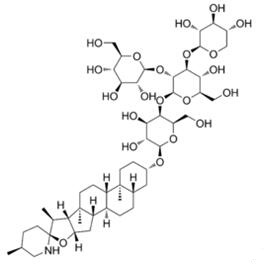
Alpha-tomatine (α-tomatine) belongs to the compound group steroidal glycoalkaloids. These compounds consist of an aglycon, which is a cholesterol derivative, and a carbohydrate chain, which in the case of α-tomatine consists of two d-glucose units, a d-galactose unit, and a d-xylose unit. In α-tomatine, the tetrasaccharide called lycotetraose is attached to the O-3 of the steroidal aglycone [2]. At first it was thought that the synthesis of steroidal alkaloids only involved multiple steps of hydroxylation, oxidation and amination of cholesterol with arginine as the source of the incorporated nitrogen. Later the glycoalkaloid metabolism genes were discovered. These genes produce the glycoalkaloid metabolism enzymes, which are responsible for the synthesis of steroidal alkaloid aglycones in potato and tomato plants. The reaction these enzymes perform are shown in the figure 1.
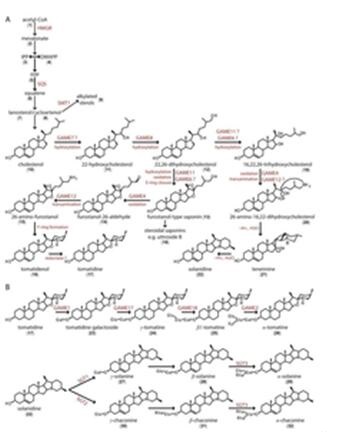
Figure 1: Biosynthesis of α-tomatine (26) and other steroidal glycoalkaloids in Solanaceae species
Tomatine may play a major role in resistance of the tomato plant against fungal, microbial, insect, and herbivoral attack. The effects of the glycoalkaloids (to which tomatine belongs), can be divided in two main parts: the disruption of cellular membranes and the inhibition of the enzyme acetylcholinesterase. Tomatine is responsible in tomato plants for resistance against for example the Colorado beetle and to snails. It is also a defense against fungi [4].
The membrane disruptive properties of tomatine are caused by the ability to form 1:1 complexes with cholesterol. This membrane disruption causes cell death by cell leakage. Also, the disrupted membrane has an influence on sodium transport, by altering the membrane potential and reducing active sodium transport. When tomatine is orally ingested, the brush border of the intestine is damaged by the membrane-disruptive properties of tomatine, so increased uptake of macromolecules occurs. This damage to the epithelial barriers is dose-dependent [1].
Tomatine is considered to be a fungitoxic compound, as it completely inhibits mycelial growth of the fungi C. orbiculare (MC100=2.0 mM), S. linicola (MC100=0.4 mM), and H. turcicum (MC100=0.13 mM). For the inhibition at a low pH, much more tomatine is required, so the compound is more effectively fungitoxic at a high pH, when the alkaloid is unprotonated. The unprotonated form of tomatine forms complexes with sterols such as cholesterol, which may cause disruption of cell membrane and changes in membrane permeability.
Tomatine has been used as a reagent in analytical chemistry for precipitating cholesterol from solution [5]. Also, tomatine is known to be an immune adjuvant in connection with certain protein antigens.
The possible risks of tomatine for humans have not been formally studied, so no NOAEL can be deduced. The toxicity of tomatine has only been studied on laboratory animals. The symptoms of acute tomatine poisoning in animals are similar to the symptoms of poisoning by solanine, a potato glycoalkaloid. These symptoms include vomiting, diarrhea, abdominal pain, drowsiness, confusion, weakness, and depression. Generally, tomatine is regarded to cause less toxic effect to mammals than other alkaloids such as solanine. The amount of tomatine absorbed by the human body as well as the possible metabolism is unknown. There is no evidence that consumption of tomatoes causes acute toxic or genotoxic effects [1].
The human consumption of moderate amounts of tomatine seems to occur without notable toxic effects. This is reinforced by the widespread consumption of “pickled green” and “fried green tomatoes” and the consumption of high-tomatine tomatoes (a variant of L. esculentum var. cerasiforme, better known as the "cherry tomato", indigenous to Peru) with very high tomatine content (in the range of 500–5000 mg/kg of dry weight).
References
[1] https://en.wikipedia.org/wiki/Tomatine
[2] Jones, Nigel A.; Nepogodiev, Sergey A.; Field, Robert A. (2005). "Efficient synthesis of methyl lycotetraoside, the tetrasaccharide constituent of the tomato defence glycoalkaloid α-tomatine". Organic & Biomolecular Chemistry. 3 (17): 3201–6.
[3] Cárdenas, P.D.; Sonawane, P.D.; Heinig, U.; Bocobza, S.E.; Burdman, S.; Aharoni, A. (2015). "The bitter side of the nightshades: Genomics drives discovery in Solanaceae steroidal alkaloid metabolism". Phytochemistry. 113: 24–32.
[4] Hoagland, Robert E.; Toxicity of tomatine and tomatidine on weeds, crops and phytopathogenetic fungi.; Allelopathy J 23.2, 2009; 425-436.
[5] Heal, K. G.; Taylor-Robinson, A. W. (2010). "Tomatine Adjuvantation of Protective Immunity to a Major Pre-erythrocytic Vaccine Candidate of Malaria is Mediated via CD8+ T Cell Release of IFN-γ". Journal of Biomedicine and Biotechnology. 2010: 834326. doi:10.1155/2010/834326. PMC 2837906. PMID 20300588.
You may like
Related articles And Qustion
See also
Lastest Price from TOMATINE manufacturers
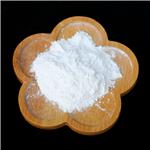
US $10.00/KG2025-04-21
- CAS:
- 17406-45-0
- Min. Order:
- 1KG
- Purity:
- 99%
- Supply Ability:
- 10 mt

US $0.00/mg2023-02-24
- CAS:
- 17406-45-0
- Min. Order:
- 5mg
- Purity:
- ≥98%(HPLC)
- Supply Ability:
- 10 g
